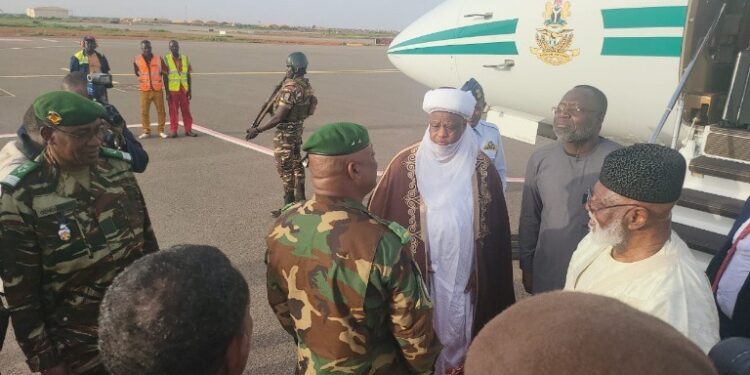The Nigerian government has dispatched a delegation to Niger Republic with a mandate to expeditiously resolve the current political impasse in the country.
According to a statement by Presidential spokesman, Ajuri Ngelale the action was in line with the resolution reached at the end of the extraordinary summit of the ECOWAS held last weekend in Abuja.
The delegation headed by former Nigerian head of state, General Abdulsalami Abubakar (rtd), left for Niamey on Thursday following a briefing by chairman of the ECOWAS authority of heads of state and government, President Bola Ahmed Tinubu, at the presidential villa, Abuja.
The former leader is joined in the delegation by the Sultan of Sokoto, Alhaji Muhammad Sa’ad Abubakar III, and the president of the ECOWAS Commission, H.E. Omar Alieu Touray.
Tinubu also sent a separate delegation led by Ambassador Babagana Kingibe to engage with the leaders of Libya and Algeria on the Niger crisis.
Briefing the two delegations, President Tinubu charged them to engage all stakeholders robustly with a view to doing whatever it takes to ensure a conclusive and amicable resolution of the situation in Niger for the purposes of African peace and development rather than a move to adopt the geopolitical positions of other nations.
“We don’t want to hold briefs for anybody. Our concern is democracy and the peace of the region,” the president said.
Speaking after the meeting, General Abdulsalami Abubakar (rtd) said the delegation would meet the coup leaders in Niger to present the demands of the ECOWAS leadership.
Both leaders of the two missions expressed optimism on the outcome of the assignments.
Meanwhile, analysts have picked holes in Niger’s coup leader, Abdourahmane Tiani’s claim that insecurity in the country is why he overthrew President Mohamed Bazoum.
An analysis of data on attacks and casualties in the country, where an Islamist insurgency has raged, shows that security was actually improving, thanks to tactics used by Bazoum’s government and help from French and U.S. forces.
Those tactics and that support are in jeopardy now.
Meanwhile, coups can stoke insecurity. Violence has soared in neighbouring Mali and Burkina Faso since their militaries took power promising peace and shunning former Western allies, according to data from the Armed Conflict Location & Event Data Project (ACLED), a U.S.-based crisis-monitoring group.
Security analysts warn that the disarray in Niger could allow groups linked to Al Qaeda and Islamic State to expand their reach across West Africa’s Sahel region, where they have already killed thousands and forced millions to flee.
It could also hobble economic development and democratic progress in one of the world’s poorest areas.
“The coup is good news for jihadist groups,” said Ibrahim Yahaya Ibrahim, a senior analyst at the International Crisis Group, a Brussels-based think tank.
“The support of international forces, the stability in the capital city, all those things are now gone. It is likely that things will go bad, he added”
In the first six months of 2023, violent incidents in Niger decreased by nearly 40 per cent compared to the previous six months, according to the ACLED data, which is based on reports from sources including news organisations, human rights groups, and local authorities.
They included fighting between the army and militants, explosions, and riots. But most incidents involve attacks on civilians, which dropped by half during that period.
Fatalities from violence, including both civilians and combatants, dropped by a third between 2021 and 2022, to just below 1,000, the data showed. They were less than 450 in the first six months of this year.
By contrast, in Mali, where there were two coups in 2020 and 2021, deaths in violent incidents more than doubled last year to nearly 5,000 as more than 2,000 French troops left and Mali’s army teamed up with Russian private military contractor Wagner Group.
In Burkina Faso, where there were two coups last year, deaths rose 80% to more than 4,000 in 2022. They have already surpassed 5,000 this year.
Reuters was unable to reach Niger’s coup leaders for comment. Military spokespeople in Mali and Burkina Faso did not respond to requests for comment.
Insecurity remains a major problem in Niger. Boko Haram insurgents from neighbouring Nigeria have plagued the southeast for years. And groups linked to al Qaeda and Islamic State are active in the southwest.
Still, many fear that the progress made could now unravel.
The United Nations special envoy for West Africa and the Sahel, Leonardo Santos Simao, said he hoped diplomacy would return Bazoum to power but worried about regional security if that failed. The main regional bloc, the Economic Community of West African States, on Sunday, gave Tiani a week to restore Bazoum, or it would consider using force.
“If the situation is not reversed, it’s very likely that the spread of terrorism in the region can increase,” Simao said.
Many are unworried. Hundreds of people marched in the capital Niamey on Thursday in support of the junta as regional defence chiefs discussed possible intervention to restore democracy.



